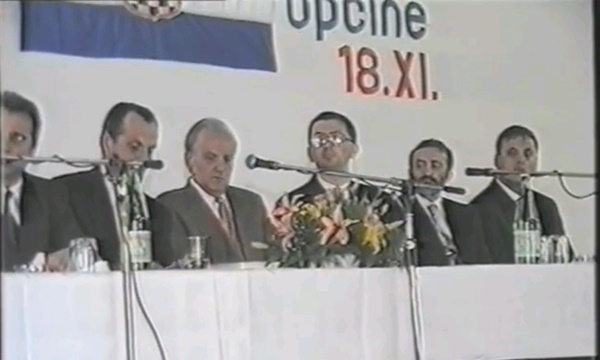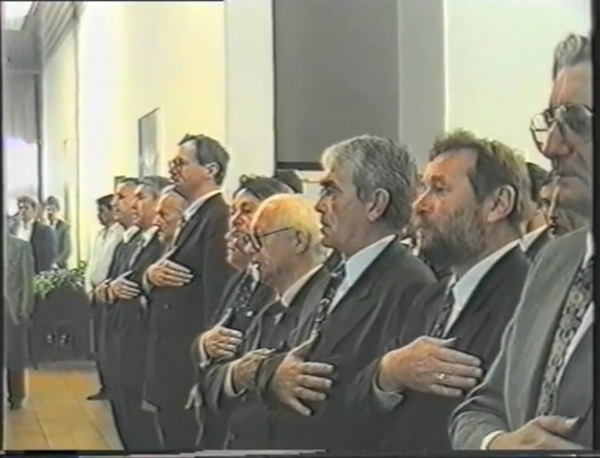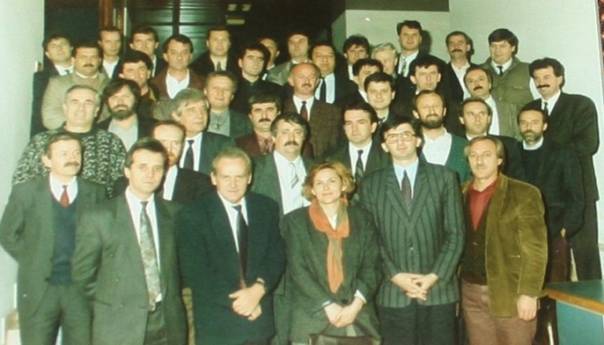For Vijesti.ba he writes: Dr. sc. Amir Kliko (Institute for Research of Crimes against Humanity and International Law UNSA)
- In accordance with the political ideas and real intentions of the President of the Republic of Croatia towards Bosnia and Herzegovina, Franjo Tuđman - and following in an almost identical way the Serbian Democratic Party (SDS), which formed "communities of municipalities" with a Serbian majority population and united them into "Serbian autonomous areas" – the Croatian Democratic Union of Bosnia and Herzegovina (HDZ BiH) founded three "regional communities: Herzegovina, Travnička and Posavina" by the summer of 1991.
At the meeting of the leaders of the "Travnik Regional Community" in Busovača on July 21, 1991, the participants recommended "the Croatian population of the Travnik Region and the municipalities of Herzegovina to join the Croatian Regional Community of Bosnia and Herzegovina." They launched an initiative "for the formation of the Croatian National Council of Bosnia and Herzegovina because of" the alleged "paralysis of the work of BiH authorities." The council was supposed to perform "the function of the government in the interest of the Croatian people in its territory." The session was chaired by Dario Kordić.
Nine months before the beginning of the Greater Serbian aggression on Bosnia and Herzegovina, the Central Bosnian, Herzegovinian and Bosnian-Savoian HDZ leaders seriously began to break up the state and form institutions to take over power. As a justification, they cited her alleged inability to respond to the political challenges that pressed upon her. The seizure of power from legal institutions - in which HDZ cadres were also active - began months before the official formation of the "Croatian communities of Bosanska Posavina and Herceg Bosna."
At the 2nd regular session of the Main Board of the HDZ BiH, the proposal from the session of the "Travnik Regional Community" was adopted, and the "Croatian Regional Community of Bosnia and Herzegovina" was formed.
On November 12 - on the day of the proclamation of the "Croatian Community of Bosnian Posavina" - a meeting of the presidents of the crisis staffs of the "Herzegovina and Travnik Regional Communities" was held in Grude, which was chaired by Mate Boban as vice president of the HDZ BiH and vice president of its crisis staff. The meeting was co-chaired by Kordić, the "coordinator of the Travnik regional community." The participants of the meeting confirmed that they stand by their earlier conclusions - made at separate sessions - "that the Croatian people of these two communities and the whole of Bosnia and Herzegovina still remain with the unanimously accepted commitments and conclusions adopted at the agreements with President Franjo Tuđman on June 13 and 20." They - "starting from the aforementioned meetings and agreements in Zagreb and through special conclusions from October 15 in Grude and October 22 in Busovača," unanimously decided "that Croatian the people of Bosnia and Herzegovina must finally lead a decisive, active policy, which should lead to the realization of our age-old dream - a common Croatian state." to approach the formulation and publication of legal and political acts (proclamation of the Croatian Banovina in Bosnia and Herzegovina and the holding of a referendum on the jučenje to the Republic of Croatia) as the first stage on the way to the final accession to Croatia." In the second point of the conclusions, the participants of the meeting identified that "in the part of the leadership of the HDZ for BiH there are still forces that oppose these historical interests of the Croatian people." These forces advocated " for a non-existent sovereign BiH, in which the Croatian people would be condemned to genocide and historical disappearance." The participants of the meeting considered themselves representatives of the entire Croatian people and decided on their behalf that they "will not accept under any conditions any solution except within the borders of a free Croatia In order to realize the "century-old dream", they believed that they had to clearly profile HDZ's policy - strengthen it in personnel and choose people who will bring the set tasks to an end - and "initiate political and legal actions on the internal and international level." For unification with Croatia was ready for war "with all those forces that will try to stop this inevitable process of creating a free Croatia It was of great importance to them to "resolutely prevent in advance any public or secret activity in the leadership of the HDZ for BiH that would oppose these decisions or could cause them any damage."

At the November 18 session in Grude, HDZ representatives from twenty-four municipalities in Bosnia and Herzegovina made a decision to establish the "Croatian Community of Herceg-Bosna" as a "political, cultural, economic and regional entity," and the "community" included thirty municipalities. Several HDZ representatives from the municipalities that joined the "HZ HB" did not attend the session. They signed the decision later. Mostar was designated as the seat of the community. Other municipalities could also access it. The founders expressed their loyalty to the republican government "as long as the state independence of Bosnia and Herzegovina exists in relation to the former or any future Yugoslavia." This means that - in the event that Bosnia and Herzegovina remains in Yugoslavia - the "community" would be territorially separated from it. Already at its founding, the "community" assumed the right to rise above the republican government, which can be seen from Article 6, in which its founders emphasized that it would also respect all valid international acts. This obligation can only be accepted by states, not "communities" such as the "HZ HB" envisioned by Article 1.
For the administrative body of the "community" a presidency was formed, which consisted of representatives of the Croatian people in the municipal government, "first in office or presidents of HDZ municipal committees."
All those present accepted and supported the decision to establish "HZ HB" except for Smiljan Pavlović from Travnik - who was against it - and Fr. Branko Neimarević from Travnik, who declared himself a abstainer.
That the "community" will opt for the division of Bosnia and Herzegovina is clear from the conclusion in its founding act, where it is said that the Croats of Bosnia and Herzegovina will support the sovereignty of Bosnia and Herzegovina until others begin to divide it. It is not emphasized that they will fight the division but it is suggested that they will join the division after others have started it. Others have already started, which was recognized among the founders of "HZ HB", and they, as a justification for their actions, interpret that the Serbs are in an advanced stage of disintegration of Bosnia and Herzegovina. The founders of the "Croatian communities" - like the SDS - wanted the division of Bosnia and Herzegovina, but they did not want to be the first to start it. There was a very specific reason for that. Croatia was already in a problem that was just waiting for Bosnia and Herzegovina. Croatian Serbs wanted to divide Croatia. Parastates were formed on a third of its territory with the active political and military support of Serbia and the JNA. They expelled the legal authorities of the Croatian government from those occupied territories. In such a situation in which Croatia found itself at the time, if the Croats of Bosnia and Herzegovina - at the persuasion of official Zagreb - were the first to begin the division of Bosnia and Herzegovina, then Croatia would lose the support of the international community in its effort to preserve territorial integrity and gain international recognition. At the time "HZ HB" was founded, Croatia was not internationally recognized as an independent state. In the event that the responsibility for the partition of Bosnia and Herzegovina falls on the Bosnian Croats and the leadership of the Republic of Croatia, this would allow the Croatian Serbs to legitimize their demands in Croatia, which would make it difficult for its international recognition in the "Avnoje borders". In this sense, the Serbian rebellion in Croatia somewhat preserved the territorial integrity of Bosnia and Herzegovina in the way that it prevented Franjo Tuđman and his political puppets in Bosnia and Herzegovina from a more direct, decisive and open approach to its division.
Two days after the publication of the decision on the formation of "HZ HB," the Government of SRBiH, based on the opinion of the Ministry of Justice and Administration, concluded that all decisions of "HZ HB" are illegal and illegitimate, and in contradiction with the Constitution and the interests of the state and all its citizens and people.
On the basis of Article 7 of the decision on the establishment of "HZ HB" dated November 18, 1991, its presidency made a decision on the formation of the Croatian Defense Council (HVO) on April 8, 1992. The Serbian aggression against "HZ HB", the lack of protection of the Croatian people and the awareness that the state is powerless because its defense system is falling apart, were cited as justifications. According to that decision, the HVO should have taken care of the defense of the sovereignty of the "HZ HB" area and the protection of the Croatians, as well as other peoples living in that "community." Otherwise, the "HZ HB" had no sovereignty because it belongs only to the states. However, it seems that the presidency of "HZ HB" counted that it was a state or that the HVO would make it so.
On April 10, 1992, Franjo Tuđman appointed Janko Bobetko as the commander of all units of the Croatian Army (HV) at its Southern Military Base. That military base included a significant part of the territory of Bosnia and Herzegovina. On the same day, Boban issued an order that the HVO is the only legal army in the "HZ HB" area and that he does not recognize the Territorial Defense of the Republic of Bosnia and Herzegovina (TO RBiH), which he declared illegal. He did not declare the Croatian army illegal or mention it, even though it was present in the "HZ HB" area.
Stjepan Mesić considered Boban's decision for the HVO to take over power in a part of the territory of Bosnia and Herzegovina, called "HZ HB", a coup d'état that illegally usurped power. He asked Boban what it was all about and warned him of the consequences. Boban explained to him that a team of lawyers from Zagreb - including Professor Smiljko Sokol and Vica Vukojević - with Tuđman's consent, devised a way for the HVO to come to power through elected HDZ BiH officials. Mesić also told Tuđman that it was a coup, which he agreed with, but two days later he told him not to interfere in the politics of Bosnia and Herzegovina and that Vukojević was in charge of that.
On April 16, 1992, Bobetko formed an advanced command post of the HV in Grude, i.e. in Bosnia and Herzegovina. He appointed Milivoje Petković as his deputy who, in his absence, had all the authority to command and coordinate combat operations. From this advanced command post of the Southern Army of the HV in Grude, the "Main Headquarters of Herceg Bosnia," that is, the HVO, developed. Its formation began with this order of Bobetko.

On May 8, 1992, Ante Rosso, whom Bobetko appointed to the "Main Headquarters of Herceg Bosnia", issued an order stating that the only legal forces in the "HZ HB" area are the HVO units. With this order, all orders of the TO RBiH command that were considered illegal in the "HZ HB" area were invalidated. Bearing in mind the fact that Rosso was a member of the HV, the conclusion follows that an HV soldier issued an order that the TO of the RBiH was illegal on the territory of his own country. Neither he – as neither Boban – mentions the presence of HV. He did not invalidate her orders, nor did he declare them illegal, as he did with TO RBiH. Certainly he could not have done that, because that would have invalidated the order on his appointment to the post in the HVO issued to him by Bobetko.
The Croatian army established military control in western Herzegovina, western Bosnia and over Croatian armed forces in central Bosnia. Bobetko urged Boban to take over Mostar, transfer the organs of "HZ HB" from Grud to it and form his own army to ensure that the city does not take over the government of Bosnia and Herzegovina.
At the session of the presidency of "HZ HB" on July 3, 1992, the decision on its establishment from November 18, 1991 was amended and supplemented. The decision is not significantly different, it is only more officially and openly confirmed, but there is one interesting statement that indicates what the HVO was fighting for: "Croats...in this Republic stood for a sovereign Bosnia and Herzegovina, but they always emphasized that they would do so by protecting own historical spaces and interests of the entire Croatian people." It is clear that the Croatian own "historical spaces" are the delineated "Croatian community" in Bosnia and Herzegovina. Therefore, the HVO did not fight for Bosnia and Herzegovina - as the Herzegovinian propaganda publicly claimed - but only for "Croatian areas" territorialized through "Croatian communities" in it.
The decision on the establishment of "HZ HB" dated November 18, 1991 determined its territory and territorial unit, and the decision dated July 3, 1992 confirmed it.
By the decision of the Constitutional Court of the Republic of Bosnia and Herzegovina on September 18, 1992, all regulations on the establishment of "HZ HB" were annulled.
On November 28, 1992, the "Department of Justice and General Administration of HZ HB" announced that only the judicial system of that community will operate in the area of "HZ HB" in the future.
By decision of July 3, 1992, the president of "HZ HB" is simultaneously the president of its presidency and the supreme commander of the armed forces. With the presidency, he exercises supreme, sovereign power.
The "Armed Forces of the HZ HB" were established by the decree of July 3, 1992 as the fundamental bearer of the armed resistance that protects the sovereignty of the "HZ HB" and defends its territorial integrity. Those provisions show that "HZ HB" behaved as an independent and sovereign state community.
By declaring a "republic" on August 28, 1993, "HZ HB" improved its governing structure. The preamble "Fundamental Decision" refers to the Croatian Christian and cultural identity. Aggression was again cited as the reason for the establishment of the "republic" - but unlike before - now it was allegedly initiated from the unitary state union of three constituent nations, referring to the alleged aggression of the Army of the Republic of Bosnia and Herzegovina.
According to Ciril Ribičić, the transformation of the "community" into a "republic" and "state union" means a further step in the process of independence towards Bosnia and Herzegovina, even though the "republic" was declared due to its entry into the union of three republics. The Owen-Stoltenberg plan had a significant influence on its declaration, which satisfied the interests of the great powers of Serbia and Croatia by recognizing the territories obtained by military force to their political-military parastatal creations in Bosnia and Herzegovina.
That plan went a step further than Vance-Owen's in terms of the territorial division of Bosnia and Herzegovina on ethnic grounds because it proposed three strictly separate entities/republics instead of a number of cantons under central authority. It was time-limited with the possibility that each republic could leave the union, become independent, or join a neighboring country through a referendum of its population after two years from the signing of the agreement. The territories of the "Serbian" and "Croatian republics" had already been ethnically "cleansed" of Bosniaks, so surely the results of the referendum would be in favor of those "republics" leaving the union.
"The Croatian Republic of HB is," according to the 'Fundamental Decision', a unique and indivisible democratic state of the Croatian people in Bosnia and Herzegovina."
It is necessary to emphasize that all cadres - and even those from the top of the HDZ BiH - did not agree with the policy of destruction and division of Bosnia and Herzegovina. The first three presidents of HDZ BiH were dismissed as a result: Davor Perinović, Stjepan Kljuić and Milenko Brkić, professor of the Faculty of Philosophy at the University of Sarajevo. General Secretary of HDZ BiH 1990-1992. - Ivan Markešić - strongly opposed Tuđman's policy of dividing Bosnia and Herzegovina, advocating for its state sovereignty and territorial integrity, within which the Croats of Bosnia and Herzegovina would solve their status and position through political, non-violent means. The president of the HDZ Mostar municipal board, Damjan Vlašić, claimed that "the separation of HZ HB according to the SAO system means ghettoization in which there is no welfare for any people."
Opponents of the formation of "HZ HB" - based on the example of "Serbian autonomous regions" - from HDZ BiH warned that it could lead to conflict with Bosniaks and lead to war. They believed that cantonization and alliance with them was a better solution and that this should not be decided outside of Bosnia and Herzegovina.
However, at its second session, on December 23, 1991, the "HZ HB" presidency authorized the Croatian president, Franjo Tuđman, to represent its interests at international and other negotiations, which significantly limited the role and authority of its highest representatives.
